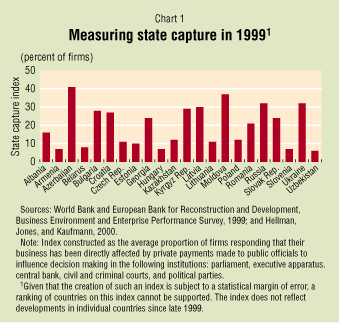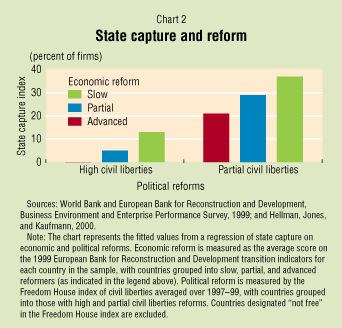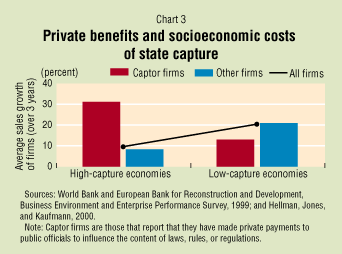 About F&D Subscribe Back Issues Write Us Copyright Information |
Confronting the Challenge of State Capture in Transition Economies Joel Hellman and Daniel Kaufmann
"I only want to draw your attention straightaway to the fact that you have yourselves formed this very state, to a large extent through political and quasi-political structures under your control. So perhaps what one should do least of all is blame the mirror."
—Vladimir Putin, in a meeting with
Russia's business leaders in July 2000 (Hoffman, 2000). When we think about corruption, an image quickly comes to mind of a bureaucrat extorting bribes from powerless individuals and defenseless firms simply to enable them to "get things done." Behind this view lies an understanding of the state extracting rents from the economy for the exclusive benefit of politicians and bureaucrats. Such an approach has had a powerful impact on the way corruption has been analyzed and measured in recent years. The resulting policy recommendations have emphasized reducing the discretionary authority of state officials to eliminate their opportunities to extract bribes. State capture—a form of grand corruption In transition economies, corruption has taken on a new image—that of so-called oligarchs manipulating policy formation and even shaping the emerging rules of the game to their own, very substantial advantage. We refer to this behavior as state capture. Though this form of grand corruption is increasingly being recognized as the most pernicious and intractable problem in the political economy of reform, few systematic efforts have been made to distinguish its causes and consequences from those of other forms of corruption. Moreover, there have not been any attempts to measure this specific type of corruption and to compare it across countries. We define state capture as the efforts of firms to shape the laws, policies, and regulations of the state to their own advantage by providing illicit private gains to public officials. We develop a method to measure this form of grand corruption based on the findings and analysis of a survey of nearly 4,000 firms in 22 transition countries. In recognizing the problem of state capture, we wish to focus attention on the complex interactions between firms and the state. In particular, we emphasize the importance of mechanisms through which firms seek to shape decisions taken by the state to gain specific advantages, often through the imposition of anticompetitive barriers that generate highly concentrated gains to selected powerful firms at a significant social cost. Because such firms use their influence to block any policy reforms that might eliminate these advantages, state capture has become not merely a symptom but also a fundamental cause of poor governance. In this view, the capture economy is trapped in a vicious circle in which the policy and institutional reforms necessary to improve governance are undermined by collusion between powerful firms and state officials who reap substantial private gains from the continuation of weak governance. Measuring state capture: two worlds While most types of corruption are directed toward changing how existing laws, rules, or regulations are implemented with respect to the bribe payer, state capture refers to corrupt efforts to influence how those laws, rules, and regulations are formed. Bribes to parliamentarians to "buy" their votes on important pieces of legislation, bribes to government officials to enact favorable regulations or decrees, bribes to judges to influence court decisions—these are the classic examples of grand corruption through which firms can encode advantages for themselves into the basic legal and regulatory structure of the economy. To measure and analyze state capture, we use data from the specially designed Business Environment and Enterprise Performance Survey (BEEPS) carried out jointly by the World Bank and the European Bank for Reconstruction and Development. Survey data were collected through face-to-face interviews in 22 transition countries conducted in late 1999. In most countries, managers or owners of 125-150 firms were interviewed, though larger samples were used in Poland (250), Russia (550), and Ukraine (250). The sample design was random in order to represent the population of firms in each country, with quotas placed on firms' size and ownership (see Hellman, Jones, and Kaufmann, 2000). We develop two different proxy measures of state capture. First, we create a cross-country index of state capture based on firms' reporting that their businesses are directly and significantly affected by private payments made to public officials to influence decision making in one or more of the following six institutions: parliament, the executive apparatus, the criminal courts, the civil courts, the central bank, and political parties. By taking the average share of firms affected across the six institutions, we develop a state capture index for each country. As Chart 1 suggests, there appears to be a gap between those countries where this form of corruption is widely seen as a serious problem, which we call high-capture economies, and those where it is seen as a relatively modest problem, which we call low-capture economies. Among the low-capture economies are both the most reform-minded and the least reform-minded countries in the region. In countries such as Belarus and Uzbekistan—where there has been minimal privatization, the private sector remains small, and important elements of the Soviet-era command system are still in operation—the capacity of private sector interests to capture the state might be expected to be low almost by definition. In contrast, the most reform-minded countries (such as Hungary and Poland) have made the most progress in liberalizing their economies, strengthening bureaucratic accountability, and promoting political contestability—all developments that might be expected to place limits on the capacity of powerful firms to capture the state.
 Political and economic reforms matter The high-capture group includes countries regarded as partial reformers in both political and economic terms. Although they have made progress in liberalization and privatization, they have been much slower to enact the complementary institutional reforms to support the emergence of markets. Furthermore, their political regimes tend to be characterized by a greater concentration of power and limitations on political competition. Indeed, Chart 2 demonstrates that the state-capture index is systematically lower in countries that have pursued more comprehensive economic reform. Furthermore, at any given pace of economic reform, there is a dramatic decline in state capture in countries with higher levels of civil liberties. Yet it is clear that the causal links between capture and reform run in both directions, which makes breaking out of the vicious circle so difficult.
 Incentives to engage in grand corruption The BEEPS also allowed us to identify firms that have paid bribes to influence the content of laws, rules, or regulations—we refer to them as captor firms. We can then compare the performance of captor firms with that of all other firms to analyze the consequences of state capture for those firms that engage in it. Although existing studies have shown that administrative bribery provides firms with few tangible gains in terms of their long-term performance, we find, in contrast, that state capture can provide captor firms with substantial gains in certain contexts. Chart 3 shows the performance, measured in terms of sales growth, of captor firms versus all other firms in both high-capture economies and low-capture economies. In high-capture economies, captor firms grow more than twice as fast as other firms. In sharp contrast, captor firms appear to enjoy few advantages in low-capture economies, where such grand corruption looks more like a survival strategy for poorly performing firms.
 Yet even in high-capture economies, the private benefits to captors of engaging in state capture are bought at substantial social cost (see Chart 3). Despite the specific benefits that captor firms enjoy in high-capture economies, the overall enterprise sector in such economies grows at somewhat less than half the rate of firms in low-capture economies. Capture is therefore a large "tax" on noncaptor firms. By contrast, captor firms receive advantages in not only sales growth but also the provision of basic public goods, such as the protection of property rights. The survey data show that captor firms can offset general weaknesses in the rule of law by purchasing individualized protection of their property rights "a la carte" from the state. In high-capture economies, captor firms are more than five times as likely as other firms to have seen improvements in the security of their property rights over time. Yet again, this comes at a significant social cost, because the level of insecurity of property rights is much higher for the average firm in high-capture economies than in low-capture economies. When politicians and bureaucrats can privately sell, with minimal political repercussions, such public goods as secure property rights to a few individual firms for private payments, they have little incentive to provide the public at large with open access to these goods. Who are the captors? Although the concept of state capture naturally conjures up images of powerful oligarchs, we find that captor firms come in a wide range of sizes and sectors. Surprisingly, captor firms are more likely to be new entrants to the market. Indeed, the data suggest an interesting and counterintuitive answer to the question of why firms engage in state capture. Many countries began transition as weak states unable to provide basic public goods and with a set of powerful incumbent firms (these were predominantly state owned and newly privatized) dominating their respective markets without having to resort to bribery payments. To compete in such an environment, new entrants adopted a strategy of state capture to buy greater security for their property rights from public officials and to encode, or incorporate, competitive advantages into the emerging legal and regulatory framework. State capture thus became a strategy for a few firms to create zones of relative security and advantage for themselves at the expense of all other firms. The data also suggest that once a country has fallen into the trap of a capture economy, foreign direct investment can magnify the problem. In high-capture economies, some types of foreign investors—those with local partners and domestic headquarters—are nearly twice as likely to engage in state capture as domestically owned firms. (By contrast, transnational firms headquartered abroad that engage in foreign direct investment in a transition economy provide kickbacks more often than domestic firms when competing for public procurement contracts; for details, see Hellman, Jones, and Kaufmann, 2001.) The dangers to the long-term development of such a capture economy are self-evident. New, dynamic entrepreneurs have strong incentives to invest their talents in capturing the state rather than in developing innovative products or production methods, in order to compete successfully in a distorted environment. The capture economy rewards connections over competence and influence over innovation; it is fueled by private investments in politics that weaken the state and undermine the provision of basic public goods. At the same time, we find that capture systematically deters private investment in the economy, both foreign and domestic, and creates obstacles to the entry of small and medium-sized enterprises, undermining the key sources of sustainable growth. Fighting corruption in the capture economy By recognizing the dynamics of state capture, we gain a much clearer understanding of the factors underlying the persistence of corruption in many transition countries. Although corruption has usually been seen as a symptom of weak state institutions, our analysis highlights the powerful forces that have a strong interest in fostering and maintaining these weak institutions. Any reforms to improve the institutional framework, which might undermine these highly concentrated advantages, will be strongly opposed by captor firms that have the political influence to derail such reforms. Consequently, tackling the problem of state capture is a prerequisite for reforms to improve governance and strengthen the legal, judiciary, and regulatory environment. But once the capture economy has become entrenched, how can the country break out of the vicious circle? Prioritizing the reform agenda The efforts of firms to influence the legal, policy, and regulatory environment within which they operate constitute a normal and indeed healthy process that is common to all countries. What distinguishes such interactions in the capture economy is exclusion. Some firms enjoy exclusive privileges to influence decisions of the state while others are systematically excluded, enabling state officials to make choices that concentrate benefits on those with access at a high cost to those who are excluded. Although the general remedies for such problems—transparency and competition—are, by now, increasingly acknowledged, the specific ways in which reform of state capture can be achieved are less obvious. Transparency refers to both the degree of openness of the state's decision-making processes and the extent of disclosure of the interactions that could influence those decisions. In most transition economies, the mechanisms through which the state deliberates on the formation of laws, rules, and decrees are still largely hidden from public view. The use of public hearings and the Internet to provide a transparent forum for open decision making is rare. Draft laws are seldom published for discussion. Transcripts of deliberations are not available for public perusal. The voting records of individual legislators are not made available to the public. At the same time, the institutional tools that various constituencies can use to gain access to the state's deliberations are very limited. Political parties are weak. Trade associations, interest groups, and collective organizations lack the resources and experience to influence policy. In the absence of access to government decision making through collective representatives, firms are compelled to seek informal, one-on-one relationships with individual state officials to represent their interests. Few transition countries have sufficient safeguards to ensure proper disclosure of efforts to influence public officials, creating an environment highly susceptible to capture. Firms have little incentive to report their political contributions, and public officials face few or no real sanctions for accepting such contributions. Periodic public declarations of assets and income sources by government officials (and at times by their dependents) are now required in many transition countries, but the relevant implementation mechanisms remain quite weak. Conflict-of-interest rules are poorly understood and barely enforced. Public interest watchdog groups have little capacity to monitor the flow of funds from firms to politicians. The lack of transparency tends to go hand in hand with insufficient competition among firms and other constituencies to influence the state's deliberative processes. In the capture economy, political influence is monopolized by powerful firms at different levels of government, with minimal checks and balances exerted by collective interests. In several transition countries, the monopolization of political channels of influence reflects the underlying structure of the economy—in particular where the high concentration of natural resources in national output creates a highly unequal distribution of power across different firms and different sectors. In other countries, such monopolization reflects continued restrictions on the extent of political competition. Fostering competition in the economy and in the marketplace for political influence is the main challenge in preventing and combating state capture. Here there is broad agreement on the steps needed to achieve reform, such as restructuring monopolies to increase competition, encouraging trade, and fostering a more favorable business environment. Although the generic solutions might be well known, how countries can formulate detailed and concrete reform measures and get them adopted and implemented, given the political economy constraints in their capture economies, is less obvious. Much emphasis has been placed on the role of external shocks or crises in disturbing the underlying political equilibrium behind the capture economy. Indeed, critical elections or shifts in political regimes can often become catalysts for politicians to seek broader constituencies by breaking the monopolization of political influence. At the same time, our analysis suggests that not enough consideration has been given to efforts to coordinate the actions of the vast majority of constituencies that lose from the capture economy while only a small cadre of influential firms gains. Mobilizing the losers in the capture economy—small and medium-sized enterprises, consumers, and other interest groups—and enhancing their collective voice to counterbalance the captors can have a catalytic effect in weakening the foundation of the capture economy. An important reform instrument that is increasingly used by the more competitive sectors, the disenfranchised, nongovernmental organizations, and others working to combat state capture is the power of data. Furthermore, policies that encourage market entry, which might be overlooked by the existing captors, are particularly important. Over time, more and more "smaller oligarchs" may emerge to compete for influence and dissipate the rents for state capture. A recognition of the challenge of state capture should be used not as an opportunity to expand the reform agenda beyond what is feasible for even the most committed reform-minded governments, but rather to prioritize that agenda more effectively by developing a clearer sense of the factors that prevent further institutional reforms. Although the largest burden of reform will clearly fall on domestic political leaders and actors within the local business community and civil society, our data show that foreign investors can also be part of the problem and, therefore, need to take further actions to alter their incentives and to promote social responsibility by foreign-based corporations where they invest. Clearly, more work needs to be done to foster a broader recognition of the enormous social, economic, and political costs of state capture. Such work should include detailed diagnostic studies of governance to explore the dynamics of state capture, as well as regular cross-country surveys, such as the BEEPS, of the interactions between the state and firms. These should be conducted not only in the transition countries but also in other regions of the world. In fact, recent in-depth diagnostic surveys of governance conducted in some Latin American countries suggest that combating state capture is also a challenge elsewhere.
References:
———, 2001, "Far From Home: Do Foreign Investors Improve Standards of Governance in Transition?" (manuscript). This paper, which is forthcoming in the World Bank Research Working Paper series, can also be found on the web at http://www.worldbank.org/wbi/governance. David Hoffman, 2000, "Putin Aims to Assure Tycoons: Russian Disavows Pressure by Police," Washington Post (July 29), pp. A1.
|